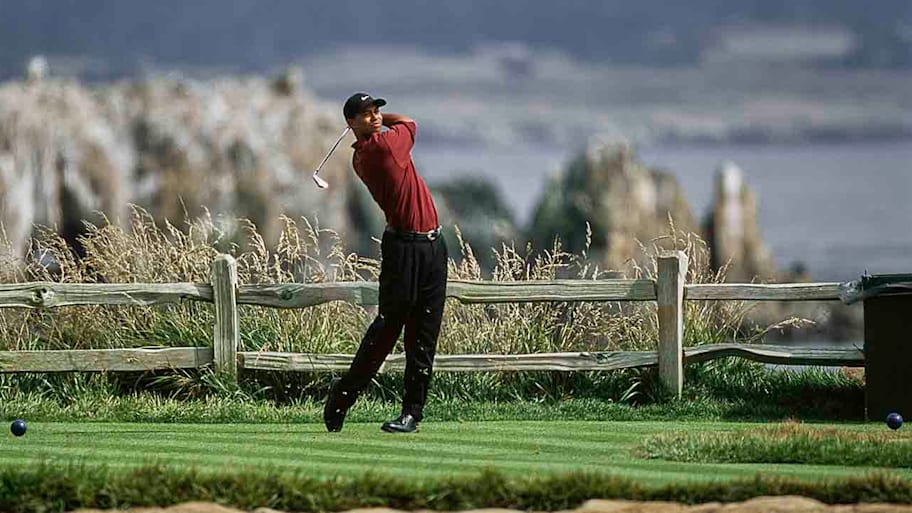“It’s just not a fair fight.”
That’s what NBC Sports on-course reporter Roger Maltbie uttered when Tiger Woods blasted a 7-iron uphill on Pebble Beach’s par-5 6th hole in the second round of the 2000 U.S. Open.
Twenty-five years later, those six words are synonymous with Woods’s historic victory—arguably the most dominant performance in sports history.
“Well, that is the one (call) that’s remembered most,” Maltbie, a five-time PGA Tour winner who has broadcast golf since 1991, recently told Sports Illustrated. “There’s no question about that.
“I mean, I still have people like you who want to know about it, and I can’t think of another call I ever made that really has garnered that kind of interest.”
Understanding Pebble Beach’s diabolical 6th hole is vital to comprehending Maltbie’s exclamation. It’s a downhill drive with bunkers left of the landing area and Stillwater Cove to the right. Woods sliced his tee shot in the rough strip separating the fairway and Stillwater Cove. Then, he faced a 202-yard blind shot over an elevated fairway.
Most players in a similar situation would have pitched out of the rough and played an uphill third shot. But not Woods. He pulled out a 7-iron instead of a wedge—and Maltbie was shocked.
“I go, ‘what’s he thinking?’” Maltbie says. “He’s aiming across this cliff with a tree growing up out of it, which is now gone, but it was there then. And it’s like, ‘What’s he trying to do here?’ I mean, this is really dangerous.”
Woods then took a gargantuan swing, moving heaven and earth with a swath of grass coming out of the rough with his club. The ball soared over the hill and trundled onto the green, stopping 18 feet from the cup. Woods missed the eagle putt, but no big deal—it was one of the most extraordinary birdies ever made.
And it yielded a lasting reaction from Maltbie.
“He’s the only guy on the planet maybe that would try it, or one of the very few, and pulls it off,” Maltbie says. “It was just one of those moments. I was gobsmacked by what I’d just seen and the only thing that came to mind was to say, ‘it’s just not a fair fight,’ and it wasn’t.”
“Who knows why it came out of my mouth, but it did.”
"It's just not a fair fight."@TigerWoods was on another level during the 2000 U.S. Open at Pebble Beach. pic.twitter.com/DDpvhglU4z
— U.S. Open (@usopengolf) February 4, 2023
Because of a fog delay, Woods didn’t tee off in the second round until 4:40 p.m. Pacific time. But once 36 holes were completed Saturday morning, he had a six-stroke lead at 8 under with only four other players under par.
He never took his foot off the gas pedal.
When it was all over, the 24-year-old had set the U.S. Open scoring record at 12-under 272, topping runner-ups Ernie Els and Miguel Ángel Jiménez by 15 strokes, the largest margin of victory in major championship history, besting Old Tom Morris’s 13-stroke win in the 1862 British Open.
“If you put Old Tom Morris with Tiger Woods, he’d probably beat him by 80 shots right now,” Els said after the final round.
With the tournament essentially over by Sunday, Maltbie recalls trying to keep the audience engaged. So he and his fellow broadcasters continuously brought up scenarios of how many major championship records Woods was chasing.
Late in the final round, however, Maltbie raised an eyebrow when Woods saved par and emphatically fist-pumped. Woods was asked about it afterward, and his response puzzled Maltbie—and still does.
“(Woods) says, ‘well, my only goal for the day was to not make a bogey, and I knew if I didn’t make a bogey, there’s no way they could beat me,’” Maltbie says.
“And we’re all going, what? We’ve all created this scenario about all the all-time records and this and that … he just didn’t want to make a bogey.”
Maybe that mindset is why Maltbie can call that U.S. Open “simply the greatest major championship performance in the history of the game” a quarter of a century later.
He isn’t alone in that opinion.
“That was my first time in the 18th tower with Johnny [Miller],” NBC play-by-play voice Dan Hicks said. “It was Pebble Beach and I couldn’t believe what this kid was doing.
“And I’ll never forget that as the historic records began piling up, I felt this pressure to try to keep up with him and get it all right. And the numbers were just mindboggling. Just every round there was another milestone. There was a possibility of setting a record, putting it out even further.
Hicks added: “It’s a sports performance that I think will never be repeated.”
And neither will the indelible phrase Maltbie emitted on the 6th hole in Round 2.
However, he doesn’t feel it’s the most renowned call of Woods’s career.
“I get some of that, yeah,” Maltbie says when asked if people still bring the call up to him. “I don’t think I get as much as Gary Koch gets for ‘better than most’ (at the 2001 Players Championship).”
Putting those two sayings head-to-head might be a fair fight.
This article was originally published on www.si.com as Roger Maltbie’s Call of a Great Tiger Woods U.S. Open Shot Resonates 25 Years Later.
